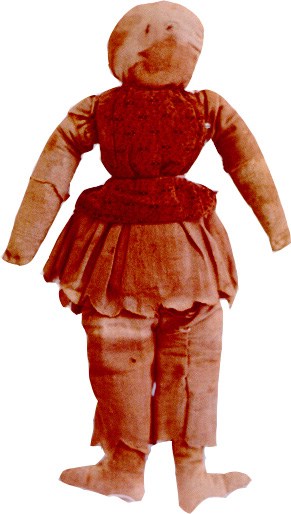
NPS Image Lula McLean's Rag Doll My name is long since forgotten; folks just call me the "Silent Witness" now. I am famous, and well taken care of but it's not the same as being loved. It all seems so long ago, back before the "late unpleasantness", when Lula and I would play for hours in the big house at Manassas. Lula McLean was seven years old the last time I saw her; she always said I was her baby. In the spring of 1861 things started to change in Virginia. Lula's parents said the Yankees were coming and we would have to leave our beautiful home. I didn't know what Yankees were, but I found out four years later. We had to move to a smaller house in a little town called Appomattox Court House . Lula's daddy said we would be safe in our new house until the war was over. He didn't know that General Lee and the whole Confederate Army of Northern Virginia would show up on our doorstep to end the war. April 9th, 1865 is a date I will never forget. That was the last time I ever saw my Lula. I was in the parlor on the sofa where she told me to wait when Lula's daddy came in with a tall man in a gray suit and shiny brass buttons. The man thanked Mr. McLean and told him the parlor would be fine. It wasn't long before another man in a gray suit arrived, accompanied by a dark haired man in a blue suit with more of the shiny buttons. The second man, who I later learned was General Lee, reminded me of Lula's kindly grandfather, but he appeared to be somewhat sad as he sat down in the large cane backed chair. Before long, I heard lots of horses and then a man in a muddy blue suit came in and began talking to General Lee. The man was the Yankee chief, Grant, and he invited more blue men into the room. I heard General Lee tell him that the terms were generous and his men needed food. Grant said he would send some. General Lee shook his hand and left, and not long after Grant left also. That was the surrender. When General Grant left the house his blue men started joking and laughing. Some of them tried to buy the parlor furniture. Some of them did not even offer to pay. One of the blue men picked me up and called me the "Silent Witness" to the surrender - so that's how I got my new name. They all laughed again and he threw me across the room at a man, called Michael Sheridan. Then I was thrown again at another man who turned out to be an officer on General Phillip Sheridan's staff. I had never been treated that way before, except once by Lula's brother John Wilmer - and her daddy soon took care of that. The blue staff officer, Captain Moore, stuffed me in his coat pocket and carried me off to to his home in New York. He must have been very proud of me because he showed me to all of his guests. I had my own little glass case with a brass plaque and was kept on the mantle in his library. After Captain Moore died, his children took care of me and continued to show me to all of their guests for years. I suppose that I never would have made it to this ripe old age without the care of the Moores, but poor Lula must have wondered whatever became of me. Finally, a hundred and twenty years later a kind lady sent me home to Virginia. Lula is long gone, our house was dismantled and reconstructed, the whole town of Appomattox Court House is a National Park, and I am famous. I am in a museum and visited by hundreds of people every day, but my favorites are the children.
|
Last updated: March 31, 2012
